Casebook 1899: The Leipzig Murders review
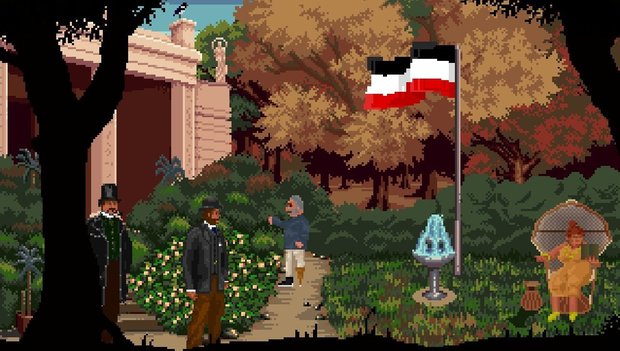
- 0 Comments
A trip back to nineteenth-century Germany uncovers a solid compilation of retro-styled whodunits
Thanks to adventure games, I’ve traveled the world and joined some of the most cunning and clever detectives of the past, present, and future to solve all manner of misdeeds. Whether taking a steamboat murder tour through Industrial Age Japan, piloting a hovercar on a manhunt through a futuristic Central Park, or prowling the seedy alleyways of Whitechapel to track down Jack the Ripper, the digital underworld has surely learned to fear my name. Now I can add turn-of-the-twentieth-century Germany to my list, thanks to Homo Narrans Studio’s point-and-click detective yarn Casebook 1899: The Leipzig Murders. While it doesn’t offer much we haven’t seen before (particularly when compared to Frogwares’ Sherlock Holmes series, which Casebook takes ample inspiration from), this retro-styled mystery proves to be a sure-footed outing that offers wit, charm, decent puzzles (with one noteworthy late-game exception), and a unique setting to add to my sleuthing portfolio.
As the final year of the 1800s marches along, Leipzig is undergoing some noteworthy changes. New technological marvels can be seen throughout the city, where horse-drawn carriages are slowly but surely giving way to coal-engine locomotives and the first commercially owned automobiles (which even play a major role in the game’s inaugural case). The social structure is also in a state of flux, with immigrants pouring in and societal castes continuously pushing for equal rights. It’s in these tumultuous times that you take on the role of police detective Joseph Kreiser, who, along with the public prosecutor Gustav Möbius, is assigned to investigate four seemingly unrelated murder cases and bring to justice the evildoers behind them. Easier said than done, as each case has a number of leads and suspects to follow up on, and it is ultimately up to you to decide whodunnit and why.
The four cases are experienced in flashback, with Kreiser coming home to the boarding house of the widow Faber at the end of a busy day of putting the squeeze on nogoodniks and regaling her with tales of his most recent cases. In a neat visual flourish, these bookend scenes in the widow’s parlor are portrayed with a limited monochrome palette and steeped in near total darkness, save for any sources of sound – the widow is blind, and we experience these short intro and outro scenes for each case from her impeded point of view. It’s a stylish design choice, even if it’s entirely insignificant to the narrative or the gameplay. The cases themselves play out in full-color pixel art as we send Kreiser around Leipzig to conduct his investigations, visiting such locations as the city’s posh theater house, its working-class slums, and even the local underground opium den.
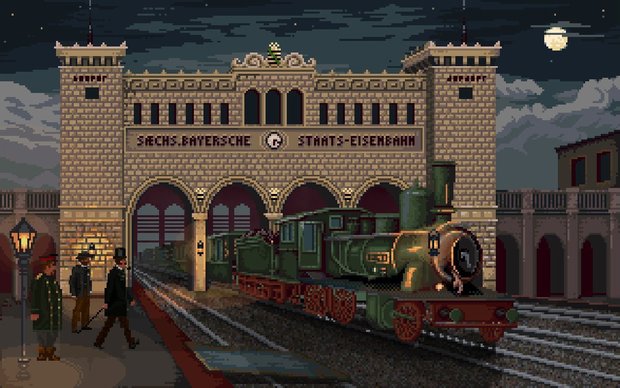
The detective legwork is tried-and-true, traditional point-and-click goodness. At the start of each case, you’ll be sent to the crime scene, somewhere in the city, where you’ll be able to examine clues, question witnesses, and begin picking up inventory items. The leads uncovered will open up new locations you can travel to using an overhead map of Leipzig. Back and forth you go, solving primarily inventory-based puzzles such as figuring out how to divert a construction worker’s attention so you can gain access to his toolbox, or how to quiet down an annoyingly loud veggie cart vendor in front of the theater. As you reach certain milestones in your investigation, facts of the case are added to your deduction board, where you can decide how they’re meant to be interpreted, eventually identifying potential suspects and their motives before bringing each case to an end by settling on one of them.
The lion’s share of Casebook 1899’s puzzles are fair and entertaining, and the game is generally a fun experience. If you need a little help, Kreiser has been given an assistant in the form of public prosecutor Gustav Möbius, who will always follow the inspector in his travels and provide general hints when requested. Möbius is able to highlight all on-screen hotspots, in case you missed clicking on an important area. Alternatively, he can also provide some general hints about what you need to accomplish or whether there’s another location you should visit instead, without providing any full spoiler solutions. The hotspot highlighter did save me once or twice, while the hint system proved useless the one time I simply needed to trigger a last specific event to let the deduction board catch up with what I’d already deduced in my own head.
Throughout the game, the puzzles are largely very manageable to solve without a heaping headache. However, the final chapter shifts significantly, in more ways than one. As the narrative is being turned on its head, you lose access to the hint systems as puzzles suddenly lean heavily into logic-based territory and become considerably more challenging, including some mathematics and sequence-based problems.
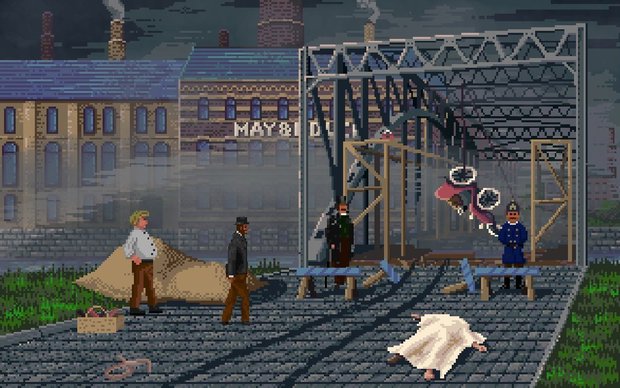
This isn’t a slam against the harder puzzles; in fact, I found the increased difficulty during the home stretch to be very engaging and worthwhile, and easily a highlight that made the climax more cerebral. The lone exception was when Kreiser had to navigate a maze of identical-looking streets and back alleys of Leipzig based on cryptic clues. Try as I might, I honestly couldn’t figure out the right way forward; even after I finally looked up the solution, I couldn’t make heads or tails of how I was meant to have reached it. Not sure what happened there, but in the entire game, it is the only puzzle I’m genuinely nonplussed about.
Whereas the puzzles worked well in keeping me engaged, the presentation did some heavy lifting of its own in creating the kind of charming atmosphere I wanted to return to for the nine hours it took me to reach the credits. Admittedly, another plus for me is the exclusively German voice acting, my native tongue, which provided an added degree of authenticity. The voice acting is pretty good, too. Your mileage may vary if having to rely on the English subtitles, but the translation seems to be generally well done. Music, while technically present every now and again, is quite minimalist, with scenes often left to play out with only the ambient sounds of tableware clattering at an outdoor restaurant, birds chirping in the trees of a park, or horses galloping by with their carriages.
Graphically, the game’s pixel art is certainly charming and quaint, though maybe a bit more low-res than we sometimes see nowadays. The settings are often portrayed in a naturalistic way, lacking bright pops of color, but that’s not to say it’s dull to look at, with some outdoor locations providing a few nice touches of greenery. You’ll even revisit a handful of locations that reflect the passing of time and seasons, like seeing the square in the theater district suddenly covered in snow during the winter months. It’s fair to say that the finer points, like characters’ facial expressions, can’t be easily made out, but the environments and the events occurring in them are still easily readable. Most characters at least get larger, slightly more detailed portraits during dialog, but these are static, without any animation that could convey emotion.
The cases you’re asked to solve are certainly compelling, even if Kreiser has the professional obligation to approach them in an impartial and dispassionate manner. A man drives his newly minted automobile into the river and dies in the process. Was it an accident, or is there reason to suspect foul play from a jilted wife, a disgruntled servant? Another man is found dead in his study – a locked-room mystery – though his career as a vicious literary critic for the local newspaper means he had no shortage of potential enemies. Due to the standalone nature of the cases, the narrative lacks a central villain, at least until an attempt is made to introduce one very late into the proceedings. By then it’s a case of “too little too late” for them to wield much of an emotional punch, however.
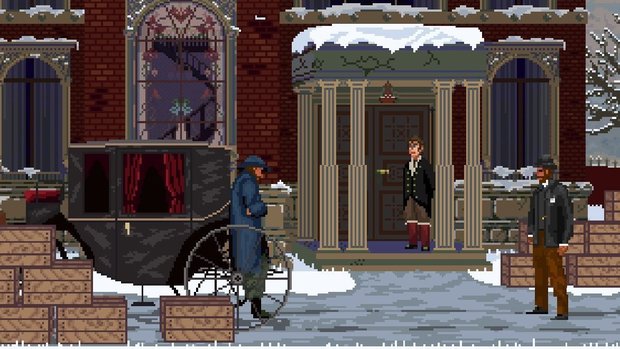
Casebook 1899 gives you some degree of agency while solving its cases, but it features quite a bit of built-in buyer’s remorse about the case solutions, purposely making you wonder whether you’ve made the right call even after it’s too late to go back. For narrative reasons, the game purposely keeps you in the dark about what the “right” calls may be, with the widow’s comments to Kreiser at times putting the kibosh on my sense of satisfaction at a job well done.
Over the course of a case, various evidence is collected and represented on your deduction board that will either exonerate certain suspects or cast further suspicion on others, depending on how you choose to interpret each piece of evidence. A ransacked suitcase, for example, could be an important clue about a murder at the train station, but it’s up to you to decide whether it has any relevance at all or is just an unrelated coincidence.
This, in turn, has a huge bearing on which suspect is eventually accused. Often, making these choices is as much based on your gut feeling as anything, as any option can seem equally plausible but have critical repercussions for those involved. In my playthrough, the widow often expressed doubt about my decisions of whom to arrest, or at least pointed out the possibility of a misinterpretation of the facts. Kreiser, unhelpfully, usually resorted to shrugging off these potential miscarriages of justice with a comment along the lines of, “What’s done is done.”
[slight spoiler warning] It’s important to note that these ambiguities about the veracity of your detective work are fully intended by the developer, as they play into a surprise plot reveal in the game’s fifth and final chapter. However, that doesn’t help matters a whole lot at the time, left potentially second-guessing your decisions with no way of going back, and feeling that the game is keeping you in the dark about each case’s true solution.
When the final twist eventually does reveal itself, it comes out of the blue, with nothing about it being previously telegraphed. This made it feel unearned, and instead of bringing the whole business to a satisfying end, it compounds the slightly anxious feeling about sending innocent citizens to the slammer throughout by pulling the rug out from underneath you one final time to boot. Credit to the developers for at least trying something a little novel with the narrative, but I didn’t feel it paid off precisely as intended. [end spoiler]
Final Verdict
For the most part, Casebook 1899 is a by-the-numbers collection of four point-and-click murder mysteries that offers a solid take on what similar titles have provided in the past. From the deduction board to the puzzle solving, it checks every required box in a traditional detective adventure, with some late-game puzzles even amping up the challenge factor. The cases are interesting enough, but I couldn’t help but feel I’d failed in my detective duties on more than one occasion, with my deductions regularly called into question. Worse, considering the fact that I was free to follow my own instincts to solve each case, having a late-game twist recontextualize huge chunks of the story and undermine all that previous agency didn’t sit well with me. Ultimately, though, the game manages to be entertaining enough to make Leipzig, Germany a unique new travel destination for traditional mystery enthusiasts to add to their digital passports.
Hot take
While not flashy or revolutionary, with the occasional questionable narrative choice, Casebook 1899: The Leipzig Murders offers exactly what it says on the tin: a solidly entertaining collection of murder mysteries designed specifically with lovers of good ol’ classic point-and-clicking in mind.
Pros
- Puzzles are satisfying to solve and largely intuitive
- Final act ramps up to some challenging head-scratchers
- Authentic German voice acting
- Lovely (if not overly expressive) pixel art
Cons
- Final act maze makes zero sense
- Questioning of deductions leads to second guessing of culprits
- Significant late-game narrative twist is unearned
- Music is a little sparse
Pascal played Casebook 1899: The Leipzig Murders on PC using a review code provided by the game's publisher.


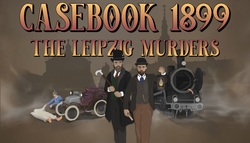







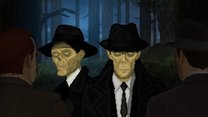
0 Comments
Want to join the discussion? Leave a comment as guest, sign in or register in our forums.
Leave a comment